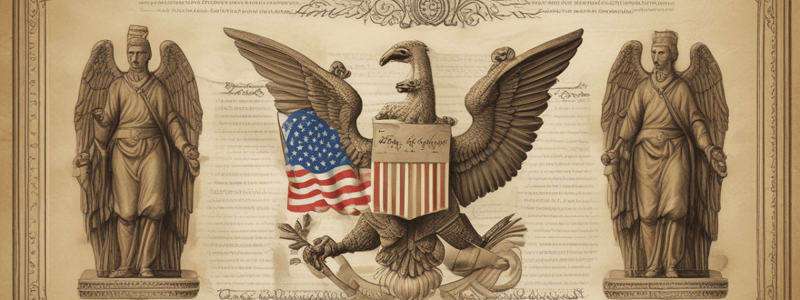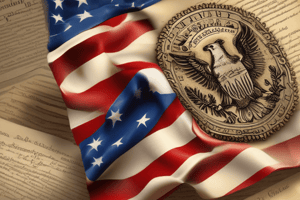Podcast
Questions and Answers
What was the primary purpose of the New Deal initiated by US President Franklin Roosevelt?
What was the primary purpose of the New Deal initiated by US President Franklin Roosevelt?
- To increase military spending
- To privatize social programs
- To reduce the power of the presidency
- To transform people's views of the role of the federal government (correct)
Which branch of the US military does the President act as the supreme commander of, including control over military strategy?
Which branch of the US military does the President act as the supreme commander of, including control over military strategy?
- US Navy
- US Air Force
- US Coast Guard (correct)
- US Marine Corps
In cases involving foreign affairs, what broad powers were granted to the President by the US Supreme Court during Franklin Roosevelt's administration?
In cases involving foreign affairs, what broad powers were granted to the President by the US Supreme Court during Franklin Roosevelt's administration?
- Limited authority in foreign matters
- Broadest latitude to use emergency powers (correct)
- No involvement in foreign affairs
- Strict restrictions on executive actions
Which landmark case granted the US Supreme Court its most significant power?
Which landmark case granted the US Supreme Court its most significant power?
What is considered the highest form of law in the United States?
What is considered the highest form of law in the United States?
What type of jurisdiction does the US Supreme Court primarily act as?
What type of jurisdiction does the US Supreme Court primarily act as?
In the federal court system, which courts have primary jurisdiction for most cases?
In the federal court system, which courts have primary jurisdiction for most cases?
'Judicial review' is a significant power exercised by which entity?
'Judicial review' is a significant power exercised by which entity?
Which branch of the US government is described in Article III of the Constitution?
Which branch of the US government is described in Article III of the Constitution?
What was the main factor in the eventual ratification of the US Constitution?
What was the main factor in the eventual ratification of the US Constitution?
Which amendment in the Bill of Rights is focused on criminal due process rights?
Which amendment in the Bill of Rights is focused on criminal due process rights?
According to the US Constitution, what prevails in case of a conflict between national and state laws?
According to the US Constitution, what prevails in case of a conflict between national and state laws?
What is the primary focus of Article V of the US Constitution?
What is the primary focus of Article V of the US Constitution?
What concept does the Supremacy Clause in the US Constitution embody?
What concept does the Supremacy Clause in the US Constitution embody?
In creating Congress, what did the founders aim to achieve regarding the President's power?
In creating Congress, what did the founders aim to achieve regarding the President's power?
Freedom of Speech, Freedom of Assembly, and Freedom of Press are guaranteed by which document?
Freedom of Speech, Freedom of Assembly, and Freedom of Press are guaranteed by which document?
What is the role of the Speaker of the House of Representatives?
What is the role of the Speaker of the House of Representatives?
Which amendment shifted the power to elect senators from state legislatures to popular elections?
Which amendment shifted the power to elect senators from state legislatures to popular elections?
What is a statutory power of the president?
What is a statutory power of the president?
What does the role of ombudsperson involve for a member of Congress?
What does the role of ombudsperson involve for a member of Congress?
Which position plays a significant role in managing and supervising the US economy?
Which position plays a significant role in managing and supervising the US economy?
What is the Electoral College requirement for a presidential candidate to win?
What is the Electoral College requirement for a presidential candidate to win?
Who is the Chair of the National Security Council?
Who is the Chair of the National Security Council?
What does a joint committee in Congress consist of?
What does a joint committee in Congress consist of?
Flashcards are hidden until you start studying
Study Notes
The Executive Branch
- The President decides when to send troops into battle and has control over military strategy, acting as the supreme commander of the US Coast Guard.
- The President has the broadest latitude to use emergency powers in cases involving foreign affairs.
The Judiciary
- The US court system is a "dual court system" with the US Supreme Court primarily acting as a court of appellate jurisdiction.
- Marbury v. Madison was an early landmark case that granted the US Supreme Court its most significant power.
- The highest form of law in the United States is constitutional law.
- The main court of original jurisdiction for most cases are the trial courts.
- The Supreme Court's most significant power is judicial review.
The Constitution
- The US Constitution describes three foundational government bodies or branches.
- The main factor in the Constitution's ratification was the promise to add a bill of rights.
- Article III describes the powers and structure of the judicial branch.
- Article V outlines the process of constitutional amendment.
- The Supremacy Clause establishes national laws as supreme over conflicting state laws.
Civil Rights/Bill of Rights
- The Bill of Rights contains broad principles and means of political expression, including freedom of speech, assembly, petition, and press.
- Focus on Amendments 4, 5, 6, and 8, known as "criminal due process rights."
The Legislative Branch
- The Framers' vision for Congress was to be responsive to the people's needs and will.
- Joint Committees include members of both chambers of Congress.
- Select Committees are created to address specific policy issues.
- Standing Committees include the House Appropriations Committee and the Senate Armed Services Committee.
- Hopper is the wooden box where House members insert proposed bills.
- Filibuster is a procedural move to halt a bill's passage.
- Congressional Oversight ensures that laws are administered according to legislators' intentions.
- A Transportation Bill is used to appropriate funds for special projects.
- The incumbent has the most important determinant in a successful congressional campaign.
The Senate
- Each state has two senators.
- The 17th Amendment shifted the power to elect senators from state legislatures to popular elections.
- The Senate Majority Leader is the most powerful person in the Senate.
The House of Representatives
- This chamber was created to closely represent the people's views.
- The Speaker of the House is the most powerful person in the House.
The Presidency/Executive Branch
- Statutory Powers are presidential powers granted by Congress.
- The Electoral College has 538 electors, and a candidate needs 270 to be elected president.
- There are 15 executive departments serving the president.
- The Office of Management and Budget (OMB) is responsible for creating the president's annual budget.
- The Head of the Department of Justice is the Attorney General.
- The Chair of the Federal Reserve Board is appointed by the president and advises on economic matters.
- The National Security Council advises the president on foreign policy and national security issues.
- If both the president and vice president die or are unable to govern, the line of succession is the Speaker of the House, Senate president pro tem, secretary of state, and secretary of the treasury.
Studying That Suits You
Use AI to generate personalized quizzes and flashcards to suit your learning preferences.




